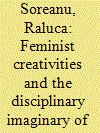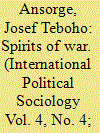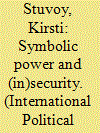|
|
|
Sort Order |
|
|
|
Items / Page
|
|
|
|
|
|
|
| Srl | Item |
| 1 |
ID:
101608


|
|
|
|
|
| Publication |
2010.
|
| Summary/Abstract |
This article identifies the limitations of classical, sociopolitical, and interactive analytical axes for explaining the crisis of paradigms and the content of Brazilian foreign policy and to propose alternative perspectives to overcome these limitations. A constructivist axis is used to examine the co-constitution of agent and structure and to identify the possibilities of change. A poststructuralist axis is used to show that Brazilian "Foreign Policy" reproduces practices of differentiation and is connected to the containment of challenges to identity. A postcolonial axis is used to show that Brazilian foreign policy can provide answers to the challenges of interaction with diversity through self-reflection and culturally diverse criticism to inequality.
|
|
|
|
|
|
|
|
|
|
|
|
|
|
|
|
| 2 |
ID:
101606


|
|
|
|
|
| Publication |
2010.
|
| Summary/Abstract |
I would like to thank Fiona Adamson, Craig Calhoun, Markus Kornprobst, Spike Peterson, Anca Simionca, Ann Snitow, Joey Sprague, Sherrill Stroschein, Christine Sylvester, and Marysia Zalewski for their engagements with the ideas presented here. I would also like to thank the referees and the editors of the journal for their constructive suggestions. A previous version of the paper was presented to the 49th Annual Convention of the International Studies Association, San Francisco, March 2008. A Visiting Fellow appointment at the Institute for Public Knowledge, New York University, allowed me the space for thought to finalize this article.
|
|
|
|
|
|
|
|
|
|
|
|
|
|
|
|
| 3 |
ID:
101603


|
|
|
|
|
| Publication |
2010.
|
| Summary/Abstract |
Liquid surveillance describes well today's regimes of in/visibility and is characterized by data-flows, mutating surveillance agencies and the targeting and sorting of everyone. However, the great virtue of Zygmunt Bauman's work for surveillance studies is that he engages several tasks: he contextualizes what might be called liquid surveillance within the major movements of modern society, recognizes the significance of changing forms of surveillance to the production of social order, encourages serious consideration of the lived realities of in/visibility, refuses to accept monocausal explanations of the surveillant vision and dynamic, and confronts courageously the ethical and political challenges that surveillance now presents to our world. Bauman's work on surveillance spans his illustrious career as a social thinker but as yet awaits full exploration and exposition.
|
|
|
|
|
|
|
|
|
|
|
|
|
|
|
|
| 4 |
ID:
101604


|
|
|
|
|
| Publication |
2010.
|
| Summary/Abstract |
This article analyzes the issue of cross-border mobility of persons viewed from a social inequality perspective. After considering the significance of social closure and border control for the historical development of modern states and citizenship, it offers a critique of restrictions on mobility rights enforced by liberal states. On the basis of empirical data on visa regulations, it demonstrates that mobility rights are distributed highly unequally, favouring citizens from rich democracies. This tendency has been accelerated and driven by the processes of globalization. The final discussion argues that under conditions of increased mobility, the polarization between those who are granted mobility rights and those who are not tends to grow.
|
|
|
|
|
|
|
|
|
|
|
|
|
|
|
|
| 5 |
ID:
101605


|
|
|
|
|
| Publication |
2010.
|
| Summary/Abstract |
Military doctrine is a system of knowledge disseminated and communicated through field manuals. This article analyzes the form and content of United States (US) military doctrine through the study of three manuals: the joint US Army and Marine Corps'Counterinsurgency (COIN) Field Manual (FM 3-24) (2007), the US Army's Stability Operations Field Manual (FM 3-07) (2008), and the US Marine Corps'Small Wars Manual (SWM) (1940). It explores and demonstrates the discursive and cognitive restraints of such military handbooks through imitating their form. In regard to content, it argues that the contemporary "spirit of war" is characterized by the organizing concepts of "culture" and "network"-seeing like a military in the twenty-first century is seeing a world of networks.
|
|
|
|
|
|
|
|
|
|
|
|
|
|
|
|
| 6 |
ID:
101607


|
|
|
|
|
| Publication |
2010.
|
| Summary/Abstract |
The general role of symbolic power in contributing to the legitimacy of security has been acknowledged, and this article seeks, more specifically, to advance the understanding of gendered power dynamics and (in)security. It demonstrates how, through their first decade of existence, nonstate crisis centers in Northwest Russia contributed to security but also to the (unintentional) marginalization of women's security. Their emphasis on victims acting on their own behalf, inducing them to becoming acting subjects, is a misrecognition of the effect of symbolic power in this field. The refusal by the Russian (patriarchal) legislature of anti-domestic violence law, combined with the hesitancy of public institutions' personnel (doctors, police, judges) to provide support for women, gives the local crisis centers, which lacked financial resources, little choice about which intervention strategies to prioritize while emphasizing women's personal responsibility.
|
|
|
|
|
|
|
|
|
|
|
|
|
|
|
|
|
|
|
|
|